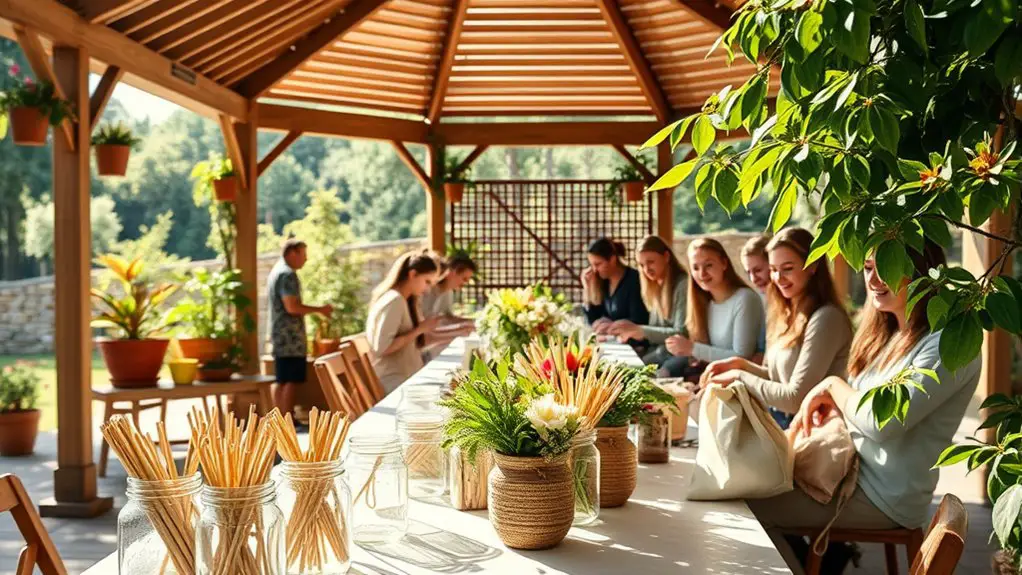Hosting a zero-waste workshop under your gazebo is a great way to boost community engagement and promote sustainability. Start by choosing a theme that resonates with your audience, like DIY projects or composting. Gather essential supplies, like repurposed materials and crafting tools. Plan hands-on activities to keep participants engaged, such as upcycling old clothes. Don’t forget to spread the word through social media. With the right preparation, your event can inspire lasting eco-friendly habits. There’s so much more to explore!
Choosing the Right Theme for Your Workshop
When planning a zero-waste workshop, how do you choose a theme that resonates with your audience? Start by considering what matters most to them—be it DIY projects or eco-friendly practices. Think about incorporating sustainable materials that participants can easily find or repurpose. You might focus on creating reusable household items or exploring the benefits of composting. Engage your audience by connecting these themes to their daily lives, showing them how simple changes can lead to significant impact. Also, consider seasonal themes; for example, a summer workshop on upcycling beach materials can be fun and relevant. Ultimately, your theme should inspire freedom and creativity, empowering attendees to embrace a lifestyle that champions sustainability.
Essential Supplies and Materials
To bring your zero-waste workshop to life, gathering the right supplies and materials is key. Start by sourcing sustainable materials like reusable bags, glass jars, and compostable utensils. These items not only help demonstrate waste reduction but also inspire participants to rethink their consumption habits. You’ll need crafting supplies such as scissors, glue, and natural dyes for DIY projects, showcasing how to repurpose everyday items. Consider providing informational handouts that outline tips for reducing waste at home. Don’t forget to include snacks or refreshments served in reusable containers to further emphasize your workshop’s theme. With these essentials, you’ll create an engaging environment that empowers others to embrace a zero-waste lifestyle.
Engaging Activities and Demonstrations
While engaging activities and demonstrations are essential for a successful zero-waste workshop, they also serve to inspire participants by turning concepts into actionable practices. Consider incorporating hands-on upcycling crafts, where attendees can transform everyday items into functional art. For example, show them how to create tote bags from old t-shirts or planters from tin cans. Additionally, teach effective composting techniques that allow participants to recycle kitchen scraps into nutrient-rich soil. You could even set up a mini composting station, letting them see the process in action. By actively involving your audience in these creative endeavors, you’re not only making learning fun but also empowering them to adopt sustainable habits in their daily lives.
Promoting Your Event to the Community
After inspiring participants with engaging activities and demonstrations, it’s time to get the word out about your zero-waste workshop. Start by leveraging social media platforms to create buzz. Share eye-catching posts that highlight what attendees will learn and how they can contribute to a more sustainable lifestyle. Don’t forget to use local community groups to spread the word; they’re a great way to reach like-minded individuals. Building community partnerships can also be a game-changer—collaborate with local businesses or environmental organizations to promote your event. They can help share your message and attract a broader audience. Remember, the more connections you make, the more you’ll inspire others to join your mission for a zero-waste future!
Tips for a Successful Zero-Waste Gathering
Creating a successful zero-waste gathering requires careful planning and attention to detail. Start by choosing a location, like your gazebo, that encourages community involvement. Invite participants to bring their own reusable items, promoting sustainable practices from the get-go. Provide clearly labeled bins for compost, recycling, and waste to minimize confusion. Consider offering a potluck-style meal where guests can share homemade dishes, reducing single-use packaging. Engage attendees with interactive activities that highlight eco-friendly tips and tricks. Make sure you communicate your zero-waste goals in advance, so everyone comes prepared. Finally, follow up with participants after the event, sharing successes and encouraging continued sustainable practices. By fostering a sense of community, you’ll inspire others to embrace a zero-waste lifestyle.
Frequently Asked Questions
Can Children Attend the Zero-Waste Workshop?
Absolutely, kids can attend the workshop! Their engagement in eco-friendly activities not only sparks their creativity but also fosters a love for sustainability. You’ll see them excitedly learning and participating, making it a fun experience for everyone.
What Weather Conditions Are Suitable for Hosting Outdoors?
For outdoor events, you’ll want sunny days with mild temperatures. These conditions create a comfortable atmosphere, encouraging participation and engagement. Plus, who doesn’t love enjoying nature while learning sustainable practices? It’s a perfect combination!
How Long Should the Workshop Last?
For ideal participant engagement, aim for a workshop duration of two to three hours. This timeframe allows you to cover essential topics while keeping energy levels high and fostering meaningful interactions among attendees.
Are There Any Fees Associated With Hosting the Workshop?
When planning your workshop, consider the balance between costs and budget. While some materials might have fees, others can be sourced for free. It’s all about being resourceful and mindful of your financial freedom.
What Should I Do With Leftover Supplies?
With leftover supplies, consider upcycling crafts to create new items or explore donation options to local schools or charities. You’ll not only reduce waste but also inspire others to embrace sustainability in their own lives.

